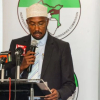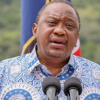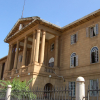
As we reflect on the life of our departed former president, it is befitting that we take a holistic picture of his contributions to our nation’s political, social, and economic well-being. There are two epochs in Moi’s public service. First, is, Daniel Moi the schoolteacher, headmaster, pre-independence legislator, MP and the cabinet minister for Education and other ministries, and third vice president of the Republic or Kenya. Second, and perhaps most controversial is his role as second president of Kenya. We quickly note that his service in the two broad categories amounts to a lifetime of service to humanity. Clearly, President Moi has the longest record of public service in Kenya’s history. Therefore, it is not easy to compress his lifetime contributions to Kenya in a single book or one -page eulogy.
Although we are free to focus our attention on his presidency, which is checkered with both good and bad memories, at this time, we must honor his contributions as a man of his time. A hero to many.
As legislator during the pre-independence times, he was the voice for African teachers, and by extension children. He fought hard to support the establishment on teachers’ unions and helped provide the legislative instruments leading to the formation of the Teachers Service Commission.
As Vice President, history gives him flying colors! No Kenyan leader traversed the depths of the country promoting the Harambe spirit like he did. President Jomo Kenyatta, as an aging leader had limited mobility and it is energetic Moi who was the face of the leadership. His imprints are all over the country. Critics argue that he named things for himself. Quite the contrary, communities named schools, roads, hospitals, and other public facilities in his honor. And Moi gave both his time and money to help build Kenya. The Nyayo hospital wards were his brainchild-a cause that should be sustained.
And even when the nation faced serious political challenges, it is Moi’s sense of calmness that gave hope. In 1967, the debates surrounding inclusivity and positions of small tribes in government were settled after Kenyatta appointed him to be the vice president. He was symbolically the voice of the marginalized. He endured insults as has been described by Joseph Karimi and Philip Ochieng and in their important book The Kenyatta Succession. However, it is not lost to historians that Moi’s first major achievement after taking over from Jomo Kenyatta was to forgive and release those detained by Jomo Kenyatta’s ruling elite. This ability to forgive is part of his humility. And he repeated it after his presidency was over. He remarkably apologized for any wrongs that he did. That is a first in African politics.
It is a lesson that he continuously preached. Not only through his Nyayo philosophy (slogan of love, peace and unity) but by the way he lived and conducted his post-presidency affairs. The idea of Nyayo is explored in his book, Kenya African Nationalism: Nyayo Philosophy and Principles (1986) which is a conservative statement about duty, nationalistic character, and political stability. For him, Nyayo was about building on Kenyatta’s legacy of peaceful coexistence and not ruining a good thing. That is why he periodically reminded Kenyans to avoid bad politics, which he argued created disorder and strife.
We pay tribute to his leadership for several other reasons, as alluded to Moi promoted education. The impact of institutions such as Moi University among others is huge. When he came to power, Kenya had only one major university with constituent colleges but by 2002, the number was six full-fledged universities. We salute his role in the expansion of education that gave Kenya the well-known edge over its neighbors.
A scanning of the 24 years of his presidency reveals that President Moi affected our national life and Africa in significant ways. Defying odds, Moi in December 1991 repealed section 2 (A) of the country’s constitution which legalized one party rule. Moi made the decision in spite of opposition from pressure from a KANU National Delegates meeting resolution in favor of continuing with the single –party state.
And significantly, in marked contrast to many of the Big Men leaders of his time, Moi handed over the instruments of power to President Mwai Kibaki. Moi kept the peace. He rarely criticized his successor. And when he spoke, it was with humility, believing that government had an obligation to help the wananchi especially those unable to help themselves.
We can’t say it enough. Moi’s usefulness will be mostly measured by his contribution sin the education sector. Not only did he support lower education, he also served as Chancellor of the public universities, including Moi, Kenyatta and Nairobi. By tying his nationalistic credentials to education, Moi encouraged the Kenyatta’s administrations system of using education as an instrument of national cohesion and development. He challenged the University of Nairobi to build its own car (Nyayo Pioneer). He wanted the university to be innovative. And he went a little further to focus on improved curriculums. Although not a perfect system, the 8-4-4 system revitalized the country’s manpower development and helped reduce illiteracy.
As a president of great consequence, Moi supported African culture. He established the Ministry of Culture and on many occasions called upon Kenyans to be proud of their own cultures without politicizing their ethnicities. It is in that light that he ordered football clubs to discard tribal names. Moi’s charge lives on today. He hosted the All Africa Games in 1987. He promoted sports as a unifying tool and his legacy on sports development does not only include stadiums-like Nyayo Stadium but tremendous success among Kenyan athletes.
We pay tribute to Moi as a strong voice for African freedom. Moi came from the generation of leaders that fought for independence. He too was a delegate at the Lancaster House Conferences that gave birth to Kenya’s freedom. We salute him as one of the founding fathers of Kenya and Africa’s sovereignty.
It will not be lost to us that as President, Moi continued to speak for Africans. A good example of his belief in Africa’s sovereignty was when he addressed a meeting in Blantyre, Malawi in May 2002. Moi told the audience at Sanjika Palace that Africa was doomed to perpetual poverty and backwardness unless her leaders set themselves free of egocentricity. Moi called for African leaders to rethink their development strategies and form an “African League” to deal with issues concerning black Africans. Moi shocked the audience when he said: “It is a pity that some of the so-called leaders went back home to chop off the limbs of their subjects including children.”
We also honor Moi for being a champion of conservation. In leadership, one has a duty to act by example. In 1989, Moi torched elephant ivory to discourage poaching. He built gabions to prevent soil erosion. He did not abandon the trenches and set an example of performing tasks that he asked others to execute.
Finally, it is important to recognize that after Moi, quit KADU for KANU, he never abandoned the independence party. This is important. It portrays Moi as a firm believer in institutions and principles. This is a lesson for Kenya’s new generation of leaders. Political parties can self-govern and reinvent, so long as they serve the interests of their members and promote a set of principles and ideals. Moi worked hard to build a KANU brand, one that conjured certain ideals. Even if it lost members, it stood for certain core ideas. By tying the president’s popularity to a set of ideals instead of a tribe, Moi was in essence a champion of enduring principles.
As KESSA (Kenya Scholars and Studies Association), we join hands with all Kenyans and mourn our departed second president. We thank him for his over five decades of dedicated service to Kenya and Africa. We send our condolences to his family and friends. Nyayo!
On behalf of KESSA,
Prof. Jerono Rotich, KESSA President and
Prof. Eric Otenyo, KESSA Board Member





Comments
Moi was a DOUBLE FACE, per…
Permalink
Moi was a DOUBLE FACE, per excellence. He ruled Kenya with an iron fist, running down the country through corruption, political cronyism & extreme brutality to legit dissent, all of which he perfected from the first Thief-In-Chief, senior Kenyatta while at the same time throwing morsels to Wanjiku everywhere he went. These are the morsels you are celebrating here in your article - shindwe kabisa!
He was a failure & yours is a feeble, hypocritical attempt at sanitizing his legacy of death & suffering that he left us. We continue to suffer today as a country
He presided over a potentially prosperous African country as it's peers in other parts of the world, notably Asia & South America whizzed past the perpetually debilitating problems of poverty, disease & ignorance that continue to define our situation today. I am talking of countries such as South Korea, Malaysia, Thailand & even China.
As you celebrate his life, thousands are mourning the loss of their loved ones who got killed or suffered immeasurably under his watch. My heart particularly goes out to patriots like Kenneth Matiba, Bishop Alexander Muge & Robert Ouko (God bless their souls), Tito Adungosi just to name a few. The blood of these brave Kenyans lies in Moi's hands, period. His (Moi’s) terrible actions as a leader far outweigh whatever little good he did
Like millions of Kenyans, and like an African, i believe he'll sort it out with his Maker, all the same but please call a spade a spade - Moi, just like Kenyatta before him, destroyed many lives
Add new comment